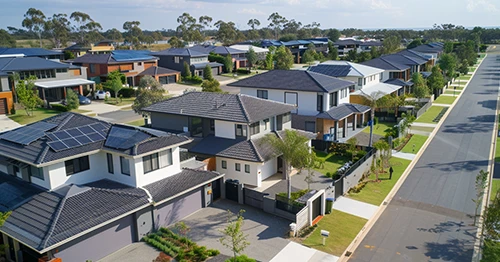Updated: 29 May, 2025
According to Australia’s most recent census, the Muslim population in Australia has reached more than 476,291, a drop in the ocean compared to our total population (2% to be exact).
Despite this, the majority of Muslims follow sharia (shari’ah) law, meaning there are literally thousands of Australians seeking home loans that abide by these laws.
So what are these laws?
Specifically, sharia law takes issue with riba, roughly translated as ‘interest’, and it is one of the foundations of Muslim trade, home loans included.
Muslims who want to take out a mortgage in Western countries such as Australia face difficulty because, according to shari’ah, charging or earning interest on loans and other types of finance is strictly prohibited.
Luckily, there are lenders out there that offer this type of finance.
Islamic finance in Australia
Islamic banking and finance (IBF) has been growing in many parts of the world over the past few decades but, despite making massive inroads, Australia has been rather slow to catch on to this new trend.
The Muslim Community Co-operative Association (MCCA) were the first providers of Islamic finance in Australia but even with only a handful few competitors, the finance provider still faces the problem of bringing in customers.
The reason could be the limited variety of services that it, and other Islamic finance providers like it, provide when compared to other Australian lenders and banks.
Another issue is that Australian Muslims tend to want the same benefits as a non-Muslim Australia, including return on investment. This has lead to a majority of Aussie Muslims preferring traditional lending banks as they can be cheaper and more convenient.
Many Australian investors also have this misconception that Islamic banking is only available to Muslims. The fact is that most Islamic banks are actually aiming to reach non-Muslim customers.
How do they work?
In a conventional mortgage, the client borrows money from a lender which is then repaid with interest.
Islamic banks have a different approach to forming relationships with their clients. Generally, the bank and clients maintain the relationship of partners, investors and trader, or buyer and seller.
By doing this, the bank promotes ‘risk sharing’ between the investor and client.
Although it is arguable that charging rent or making a profit may be no different to charging interest, Islamic finance experts explain that there is a difference in the way the money is made.
Like traditional home loan arrangements, payment of the entire sum is made by the borrower in instalments (after the bank buys the property and sells it to the customer at a profit). The benefit though is that you’re protected from interest rate fluctuations as you would be with a typical variable rate interest mortgage
Islamic finance institutions try to provide a competitive deal while still conforming with the principles of shari’ah law. This sometimes restricts them from reaching out to clients because of the limited number of facilities they are able to offer.
What kinds of sharia compliant home loans are there?
A sharia compliant home loan commonly has four models to assist you in purchasing a property:
- Mudarabah, which can be loosely translated as ‘profit-and-loss sharing’, is similar to a partnership where one partner lends money to another so they can invest it in a commercial enterprise. The first partner invests in the enterprise while the other has the responsibility to manage and work on the investment. By doing this, each partner shares a responsibility in the loan.
- In an Ijara arrangement, which means ‘lease’ in Arabic, the bank buys the property that you’re looking to purchase and then leases it out to you. The bank transfers the ownership of the property to you once the loan term ends.
- Under a Musharaka, meaning ‘partnership’, you and the sharia compliant lender buy the property together. Afterwards, you gradually buy the bank out of it. To explain, if you put down 20% of the purchase price, the lenders will pay the remaining 80% of the purchase price. You then need to pay monthly rent on the share to the bank, as well as buy more shares in the property. The more shares you own, the less rent you pay to the bank, until you own the property outright at the end of the loan term.
- A Murabaha plan (only offered in Victoria) is where the bank will buy the property you want and immediately sell it on to you for a profit. The name can be loosely translated to ‘profit’.
You pay fixed monthly repayments on the higher price without paying any interest back to the bank.
For example, if the bank buys a property worth $300,000, then it may sell it to you for $350,000 and you will need to pay the sum back in a fixed period. - In a Wakala, you make an agreement with the bank that they will work as your agent. By doing this, the bank can use their money to invest in sharia compliant trading activities to generate a target profit for them.
How are they different from traditional home loans in Australia?
Zakat refers to annual payment that is made under Islamic law on certain types of property.
The payment from zakat is used for charitable or religious purposes and is a mandatory process for Muslims in order to physically and spiritually purify any additional earning they have made over the year.
Islamic banks and institutions generally consider zakat as a form of tax. A number of banks have included a zakat collecting service whereby they will help clients pay out their zakat by setting the amount aside for charity, religious activities or for those in need.
These institutions also seem to have a soft spot for defaulters as they don’t have any provision to charge an additional fine in case a client defaults.
Only a small amount of compensation is charged, which usually varies from one bank to another.
Funnily enough, you can still qualify for the Australian Government’s First Home Owner’s Grant scheme, under the condition that the application is provided to your bank three weeks before settlement.
Which lenders provide these products?
Want to know which major banks and lenders provide Islamic banking services?
Although Australia caters to more than 20 approved foreign banks plus a number of foreign subsidiaries such as Arab Bank Australia and Hongkong and Shanghai Banking Corporation (HSBC), none of them offer Islamic ‘windows’ (a department in a conventional bank which offers Islamic financial services).
This gives conventional banks the opportunity to provide Islamic finance, provided client funds are set apart from the rest of the bank.
Despite this, it is recommended that you consider a few things before you take out a loan from any Islamic finance institution:
- Is the Islamic finance institution MFAA approved?
Are they a certified member of the Mortgage and Finance Association of Australia (MFAA)? - Do they have a credit licence?
They must hold an Australian Credit Licence (ACL) number which identifies them as an institution engaged in legal credit activities.
Is there anything else I need to know?
Sharia compliant mortgages, in most cases, offer the same features as a conventional home loan.
Some sharia products actually speed up the transfer of property ownership while others provide the option of lower payments if you make lease payments only.
Although there are some Islamic banks that are less restrictive, most only provide their services to Muslims. In fact, it’s not uncommon for some shari’ah compliant lenders to request additional documents regarding the client’s faith in order to move the loan process forward.
Home loans that adhere to shari’ah can be more expensive than typical mortgages when you consider the special circumstances surrounding the loan.
For example, if you’re applying for a lease on a property, additional costs such as legal/government fees, stamp duty and valuation fees will all be added to the overall lease, therefore the lease payments will be higher.
You should speak to finance professional such as a qualified mortgage broker before making a decision on a financial product.
You can call us on 1300 889 743 or fill in our online enquiry form.
GET ENROLLED FOR THE
Home Buyers Program
Thinking of buying a home?
Learn how to buy a house and avoid costly mistakes in under 2 hours.
Learn More





